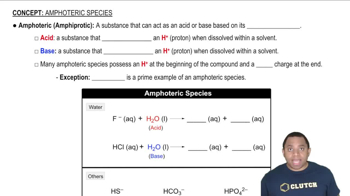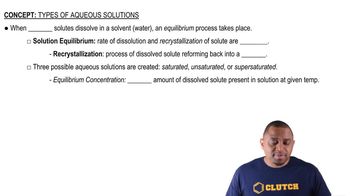Here are the essential concepts you must grasp in order to answer the question correctly.
Bronsted-Lowry Acid-Base Theory
The Bronsted-Lowry theory defines acids as proton donors and bases as proton acceptors. In this context, species that can donate a hydrogen ion (H+) are classified as acids, while those that can accept a hydrogen ion are classified as bases. This theory helps in understanding the behavior of various species in aqueous solutions, particularly in identifying their roles in acid-base reactions.
Recommended video:
Bronsted-Lowry Acid-Base Theory
Amphoteric Species
Amphoteric species are substances that can act as either an acid or a base depending on the circumstances. For example, water (H2O) can donate a proton to become hydroxide (OH-) or accept a proton to become hydronium (H3O+). Recognizing amphoteric behavior is crucial for determining which species can participate in both acid and base reactions in a solution.
Recommended video:
Equilibrium in Aqueous Solutions
In aqueous solutions, chemical species exist in dynamic equilibrium, meaning their concentrations can change based on reactions occurring in the solution. Understanding this equilibrium is essential for predicting how species like H2S, HS-, and S2- will behave as acids or bases, as well as how they interact with water and other ions present in the solution.
Recommended video:
Types of Aqueous Solutions



